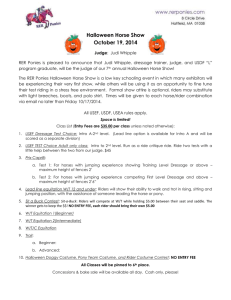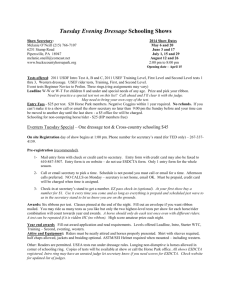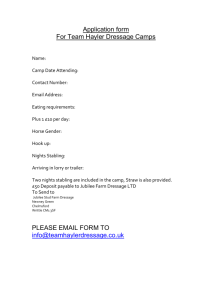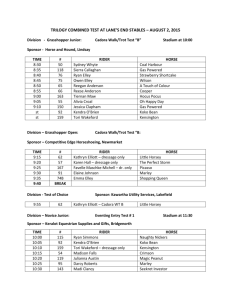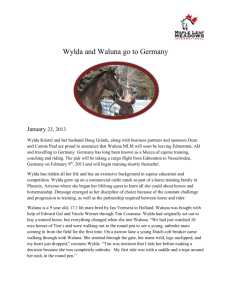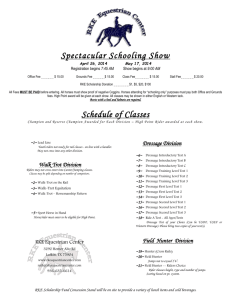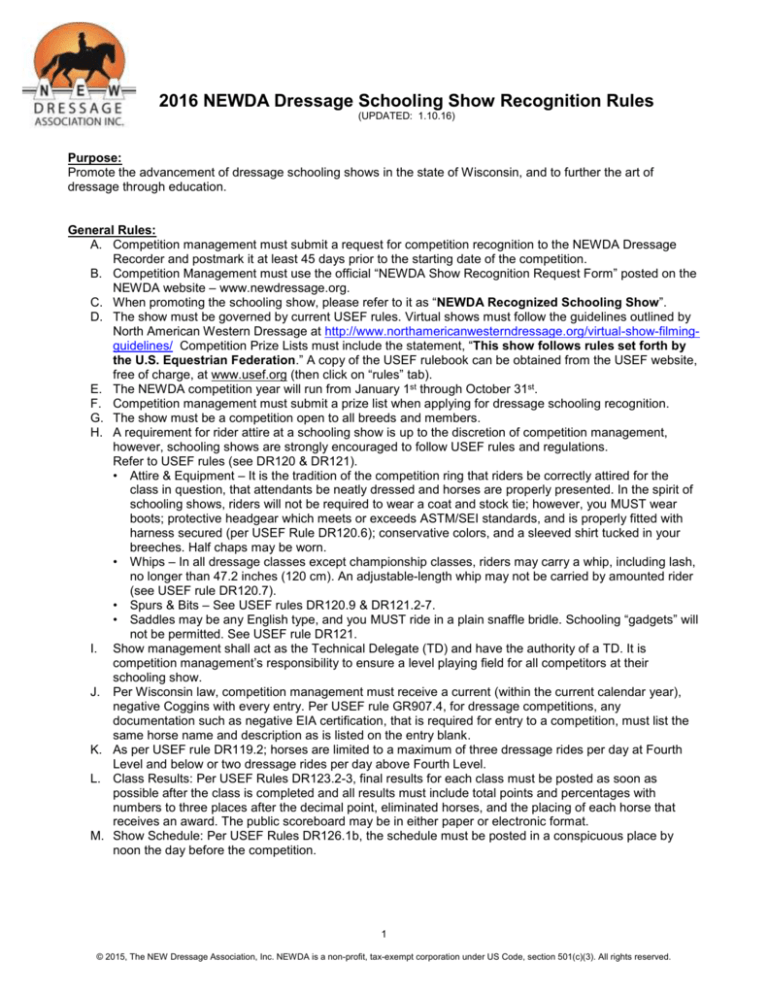
2016 NEWDA Dressage Schooling Show Recognition Rules
(UPDATED: 1.10.16)
Purpose:
Promote the advancement of dressage schooling shows in the state of Wisconsin, and to further the art of
dressage through education.
General Rules:
A. Competition management must submit a request for competition recognition to the NEWDA Dressage
Recorder and postmark it at least 45 days prior to the starting date of the competition.
B. Competition Management must use the official “NEWDA Show Recognition Request Form” posted on the
NEWDA website – www.newdressage.org.
C. When promoting the schooling show, please refer to it as “NEWDA Recognized Schooling Show”.
D. The show must be governed by current USEF rules. Virtual shows must follow the guidelines outlined by
North American Western Dressage at http://www.northamericanwesterndressage.org/virtual-show-filmingguidelines/ Competition Prize Lists must include the statement, “This show follows rules set forth by
the U.S. Equestrian Federation.” A copy of the USEF rulebook can be obtained from the USEF website,
free of charge, at www.usef.org (then click on “rules” tab).
E. The NEWDA competition year will run from January 1st through October 31st.
F. Competition management must submit a prize list when applying for dressage schooling recognition.
G. The show must be a competition open to all breeds and members.
H. A requirement for rider attire at a schooling show is up to the discretion of competition management,
however, schooling shows are strongly encouraged to follow USEF rules and regulations.
Refer to USEF rules (see DR120 & DR121).
• Attire & Equipment – It is the tradition of the competition ring that riders be correctly attired for the
class in question, that attendants be neatly dressed and horses are properly presented. In the spirit of
schooling shows, riders will not be required to wear a coat and stock tie; however, you MUST wear
boots; protective headgear which meets or exceeds ASTM/SEI standards, and is properly fitted with
harness secured (per USEF Rule DR120.6); conservative colors, and a sleeved shirt tucked in your
breeches. Half chaps may be worn.
• Whips – In all dressage classes except championship classes, riders may carry a whip, including lash,
no longer than 47.2 inches (120 cm). An adjustable-length whip may not be carried by amounted rider
(see USEF rule DR120.7).
• Spurs & Bits – See USEF rules DR120.9 & DR121.2-7.
• Saddles may be any English type, and you MUST ride in a plain snaffle bridle. Schooling “gadgets” will
not be permitted. See USEF rule DR121.
I. Show management shall act as the Technical Delegate (TD) and have the authority of a TD. It is
competition management’s responsibility to ensure a level playing field for all competitors at their
schooling show.
J. Per Wisconsin law, competition management must receive a current (within the current calendar year),
negative Coggins with every entry. Per USEF rule GR907.4, for dressage competitions, any
documentation such as negative EIA certification, that is required for entry to a competition, must list the
same horse name and description as is listed on the entry blank.
K. As per USEF rule DR119.2; horses are limited to a maximum of three dressage rides per day at Fourth
Level and below or two dressage rides per day above Fourth Level.
L. Class Results: Per USEF Rules DR123.2-3, final results for each class must be posted as soon as
possible after the class is completed and all results must include total points and percentages with
numbers to three places after the decimal point, eliminated horses, and the placing of each horse that
receives an award. The public scoreboard may be in either paper or electronic format.
M. Show Schedule: Per USEF Rules DR126.1b, the schedule must be posted in a conspicuous place by
noon the day before the competition.
1
© 2015, The NEW Dressage Association, Inc. NEWDA is a non-profit, tax-exempt corporation under US Code, section 501(c)(3). All rights reserved.
N. Arena Standards (Per USEF rules DR126.1f):
• A regular sized dressage arena, either 20 meters x 60 meters or 20 meters x 40 meters (small size),
as appropriate for the tests offered, must be used. The arena size(s) to be used must be specified in
the prize list.
• The arena must be marked with the regulation letters, appropriately placed.
Competition Staff:
A. In accordance with USEF rules (GR1202.5 & GR1203.1), a manager or secretary of a dressage
competition may not compete as rider or handler in his or her own competition. However, he or she may
show Hors de Concours if he or she designates an assistant in charge while he or she is showing.
Judges:
A. The show, whether in-person or virtual, must hire USEF licensed judge or a USDF “L” Program Graduate
(eligible to judge introductory thru second level). Sport Horse classes must be judged by an USEF Sport
Horse judge in order for the scores to qualify for year-end NEWDA In-Hand Sport Horse Awards. Handler
classes can be judged by a USEF licensed judge in order for the scores to qualify for year-end NEWDA
In-Hand Sport Horse Awards. Visit the USEF website for a list of judges at www.usef.org or visit the
USDF website for a list of “L” Program graduates at www.usdf.org.
B. Per USEF rule DR126.1d, no judge shall be required to officiate longer than 8 hours in one day, unless
the judge has agreed in writing, and cannot be required to be on the competition grounds longer than
10 hours. Judges must be given at least a 45-minute lunch break and at least a 10-minute break every
2 hours.
C. Judges can only judge those classes for which they are licensed to do so.
a. USDF “L” Program Graduate = USDF Introductory thru USEF 2 nd Level
b. USEF “r” Recorded Dressage Judge = USDF Introductory thru USEF 2 nd Level
c. USEF “R” Registered Dressage Judge = USDF Introductory thru USEF 4 th Level
d. USEF “S” Senior Dressage Judge = All classes, including USEF Level tests and FEI Level tests
Conflicts of Interest:
A. NEWDA will follow USEF rules (GR1038, GR107 & GR1304), as it pertains to conflicts of interest for
judges, competition staff and competitors.
B. NEWDA recommends that competitions do not conduct a schooling show in conjunction with a clinic,
unless the clinic falls after the competition. As per USEF rule (GR1304.12), no rider may compete in a
dressage class before a judge by whom he or she has been instructed, coached or tutored with or without
pay within 30 days of the day of the competition. If a clinic is held less than 30 days prior to the show date,
competition management must provide the NEWDA Dressage Recorder with a list of clinic participants.
Those scores earned by clinic participants at the dressage schooling show will not count towards NEWDA
year-end awards.
Competition Results:
A. Competition results must be sent (email is the preferred method) to the NEWDA Dressage Recorder
within 2 weeks following the show. Competitions are strongly encouraged share their results in the
NEWDA Forward newsletter. Submission to the newsletter is not a substitution for submitting results to
the NEWDA Dressage Recorder. Handwritten results must be legible or they will not be accepted.
B. The final competition score sheet with complete listing of ALL competitor names, judges, scores
(percentages) and placing for all classes shall be sent for verification of NEWDA year-end schooling show
award eligibility. Per USEF rule (DR123.2), total final results must be published in marks as well as in
percentages with numbers to three places after the decimal point.
C. Submission of all show results to the NEWDA Dressage Recorder after completion of schooling show
should include the date of the competition, competition name, judges, show manager and/or competition
secretary, and list of rides sorted by dressage level with name of competitor, horse’s name, level, final
score (to 3 decimal places) and placing in class.
2
© 2016, The NEW Dressage Association, Inc. NEWDA is a non-profit, tax-exempt corporation under US Code, section 501(c)(3). All rights reserved.
D. Incomplete results will be returned to competition management for correction. If results are not returned
corrected, within 15 days, the results for that show will be considered null & void and will not count
towards NEWDA year-end awards.
E. A NEWDA Recognized Schooling Show that does not submit results for the 2016 competition season,
within the designed time frame will be receive a $15 penalty. The $15 penalty must be paid to NEWDA if
the schooling show wishes to be granted NEWDA schooling show recognition for the 2017 awards
season.
Division Definitions:
A. Adult Amateur – Competitors shall compete as Adults from the beginning of the calendar year in which
they reach the age of 22. An Adult Amateur does not accept payment for teaching lessons, training or
showing horses for others. NOTE: Riders competing as an adult amateur in a NEWDA recognized
schooling show, must have an NEWDA Adult Amateur Affidavit on file with the NEWDA Dressage
Recorder. The NEWDA Adult Amateur Affidavit can be obtained from the NEWDA website at
www.newdressage.org.
B. Junior/Young Riders – Competitors are Junior Riders until the end of the calendar year in which they
reach the age of 18. Competitors are Young Riders until the end of the calendar year in which they reach
the age of 21.
C. Open – Competitors who accept payment for teaching lessons, training or showing horses for others must
compete in the Open Division or compete Hors de Concours.
D. Hors de Concours – When a competitor (a horse and rider combination) chooses to compete Hors de
Concours, it means that the ride will not count for placing or year-end awards. Per USEF rule GR827.1,
once a horse competes Hors de Concours, the horse cannot compete in a subsequent class on the same
day. However, the rider of a Hors de Concours horse may compete in subsequent classes on another
horse. Hors de Concours scores will not be published and do not need to be reported with show results.
NEW Dressage Association Statement of Animal Welfare:
NEWDA strongly recommends that schoolings shows adopt a statement of animal welfare. The welfare of the
horse must be paramount. As per USEF rule GR839, cruelty to or the abuse of a horse is forbidden. The following
acts are examples of cruelty:
1. Excessive use of a whip, spurs and/or bit on any horse.
2. Except in emergency situations, any striking of a horse in front of the shoulder with the whip shall be
deemed excessive as shall hitting a horse more than three times for any one incident.
3. Showing a horse with raw or bleeding sores around the coronets, pasterns or legs.
4. Riding an exhausted horse or excessive pressing of a tired horse.
5. Riding an obviously lame horse.
6. Inhumane treatment of a horse.
Outlined below you will find the USDF Statement of Animal Welfare (also found on www.usdf.org):
3
© 2015, The NEW Dressage Association, Inc. NEWDA is a non-profit, tax-exempt corporation under US Code, section 501(c)(3). All rights reserved.
In addition, the United States Dressage Federation does not approve of training techniques such as hyperflexion,
especially when taken to an extreme. While we recognize that we cannot control how riders train at home,
excessive techniques should not be tolerated at competitions. The Humane Society of the United States believes
that the humane treatment and training of all horses — whether they are high-level competition horses
or companion animals — should be of paramount importance to the rider, trainer, discipline and industry. The
HSUS has long advocated for the use of humane training techniques and has actively worked to end cruel
training methods.
NEW Dressage Association will:
A. List the show in the Events Calendar of the NEWDA newsletter and website;
B. Recognize scores earned at a NEWDA Recognized Schooling Show for NEWDA members for
computation of NEWDA year-end awards.
4
© 2016, The NEW Dressage Association, Inc. NEWDA is a non-profit, tax-exempt corporation under US Code, section 501(c)(3). All rights reserved.

